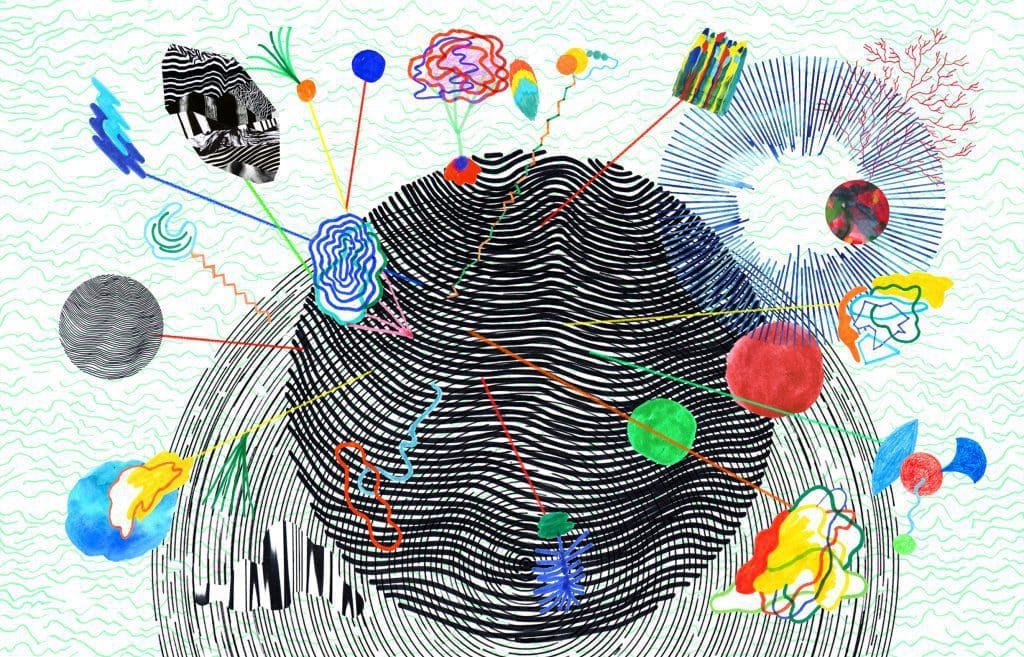(editor’s note) Challenged for its ethnocentrism and the legacy of colonialism and global capitalism, the term “world music” raises questions. Should we update our words, that carry, summon and shape our imaginations and our sensibilities ? Words that have consequences for the material conditions of creation, distribution and reception of the works produced.
Four articles open this reflection:
- a sociolinguistic point of view, with an investigation by researcher Philippe Blanchet
- a journalistic point of view with the analysis of Shiba Melissa Mazaza
- a musicological point of view, with a study by ethnomusicologist Marta Amico
- an artistic point of view, with a collection of testimonies from artists of different generations by Anne-Laure Lemancel.
Everyone knows what they are talking about when they use the terms World Music, musiques du monde in French, and they are often viewed as synonymous. Failing any common aesthetic, this music is defined by its otherness compared with a paradigmatic “we” referring to so-called “Western” culture including classical and pop music, among others. Yet the ‘s’ added to “musique” in the accepted French term casts some doubt. Is ‘LES musiqueS du monde” a faithful translation of World Music (in the singular)? This article offers a short history of both terms and of some arguments which accompanied their first use, ending with the twists and turns induced by the recent digital expansion.
The launching of World Music has been extensively chronicled in the sector’s press, which talked of an encounter in a London pub in 1987 when English-speaking professionals discussed the creation of a market category or “genre” aimed at making visible, and saleable, music whose common link was its otherness compared with the Euro-American mainstream dominating the record industry. In this sense, the creation of World Music was a reaction by independent labels to the monopoly of record companies, while at the time the famous big six exercised control and held the profits of the music recorded in a large part of the planet. In the face of these majors, some small committed producers, talented artists, records unclassifiable within the old musical “genres” finally came onto the international market and found visibility, profitability and a form of recognition there.
In France, 1987 was also the date of the release of the first hit in this genre, the song Yeke Yeke by the Guinean musician Mory Kante, of which millions of copies were sold, winning him a “gold disc”.
Mory Kante - Yeke Yeke
The release of this song was not an isolated case, but in a favourable context, it participated in the breakthrough of World Music and cultural diversity. Following the gaining of independence by former colonies during the 1960s and 1970s, some travellers and researchers such as Charles Duvelle and Pierre Schaeffer began publishing “traditional music” related to ideas of authenticity and cultural heritage. Dedicated structures such as Cherif Khaznadar’s Maison des Cultures du Monde (Centre for Intangible Cultural Heritage) or the festivals which have cropped up almost all over France (in Angoulême, Châteauvallon and Ris-Orangis) have scheduled this music and created a taste for “different” musical shows. At the beginning of the 1980s, President Mitterand liberalised independent radio stations, which began to broadcast eclectic, new styles of music using the tag “sono mondiale”. At the same time, the music of post-colonial immigration began to emerge into the public sphere, owing to the success of the Algerian Khaled and that of Touré Kunda, a group made up of Senegalese immigrants.
Touré Kunda - Emma
Following this French history, it seems to be that World Music is a common category related to a market economy in which France entirely participates, but with specificities such as deliberate cultural policies which mean that developments within France are not the same as elsewhere. Indeed, the institutions reclaimed this motion when Jack Lang doubled the Ministry of Culture’s budget and promoted cultural democracy based on an idea of horizontal support for all genres, including so-called “popular” ones, which allowed the World Music sector to gain some structure.
Lang’s policies and the effervescence of militant structures which had inherited principles of “popular education” have meant that in France, World Music has been perceived as a product of Anglo-Saxon hegemony and neo-libertine marketing strategies, which wish to bend difference to the laws of the market and recognise music in a singular world. So, the term World Music has been rapidly displaced. In its place, there are “musiqueS du monde” (World MusicS) thought of as being plural, open, committed, financed in a large part by public money.
Khaled - Didi
In keeping with the competitive market, the debates between World Music and “musiques du monde” summarise the tension in play between resistance to the system and fitting it, tension which is characteristic of globalisation. France stands apart from the Anglo-Saxon market through militant local stakeholders who promote an ethical and positive view of the guardianship of cultural diversity supported by the public authorities. This political engagement shows the imprint of the paradoxes of French-style multiculturalism, where diversity is delightful on the musical stage while in other spheres, such as the management of immigration and borders, diversity is a problem which has to be managed. Thus, international institutions such as UNESCO have a place within this controversy when they extend their logic of heritage to immaterial assets, which has the effect of promoting some cultural practices and also of freezing them in an eternal present, waiving any characteristic contrary to a positive idea of tradition, authenticity and purity.
On balance, the dispute between World Music and “musiques du monde” says a great deal about the debates hiding behind an often magical presentation of cultural diversity, polarised between exploitation and preservation, authenticity and marketing, tradition and innovation. The usefulness of the terms World Music/”musiques du monde” is perhaps right there. The ambiguity surrounding their aesthetic content allows political and economic categories and the category of identity to be defined, mobilised by stakeholders, professionals, musicians, technicians and audiences to give body to various societal projects, to confront them and knock them down.
Now, 30 years after the first disputes, the eruption of the digital age in production, broadcasting and listening to music has come to question World Music’s dominant relationships and to bring up afresh the debates which accompanied its origins. The record economy on which the first World Music was built has been completely wiped out for the benefit of recordings sometimes produced directly in the so-called “southern” countries and shared in the form of digital files for the price of a high-speed connection. Now, someone passionate about music can moreover find something to satisfy his or her ears surfing on virtual platforms, from storage websites for the general public such as YouTube or Spotify with blogs by experts which might hide some unknown titbit or digitised historical archives to performances freshly released on sound cards. The sound and music professions are mushrooming in several so-called “southern” countries, as well as Western producers, who are not the only proponents broadcasting World Music and musicians are able to find sound and marketing experts locally, on the spot.
How have these changes influenced the economic structures, production processes and distribution networks introduced over 30 years of World Music? What new opportunities are opening up for “world” musicians? Are listeners coming up against a wider, more democratic offer than that made via the mechanism of record releases? Indeed, although the emergence of digital means was welcomed enthusiastically in many emerging countries, as a tool for emancipation and progress, national and regional disparities in terms of access to networks and goods, the mastery of tools and professional training in digital professions should also be considered. The supposed horizontality of digital means, involving very high-speed connections between regional capitals and Western production centres, also presents the question of the democratisation of use, the distribution of resources and support structures. We could also ask how the balance between technological mastery and the power of negotiating the identity of the sounds and cultures will play out. These questions are encouraging some people to declare the end of World Music as we know it. What is certain is that we should continue to watch its aesthetic, political and technological development and build on its past history to better understand the future of our musical worlds.


